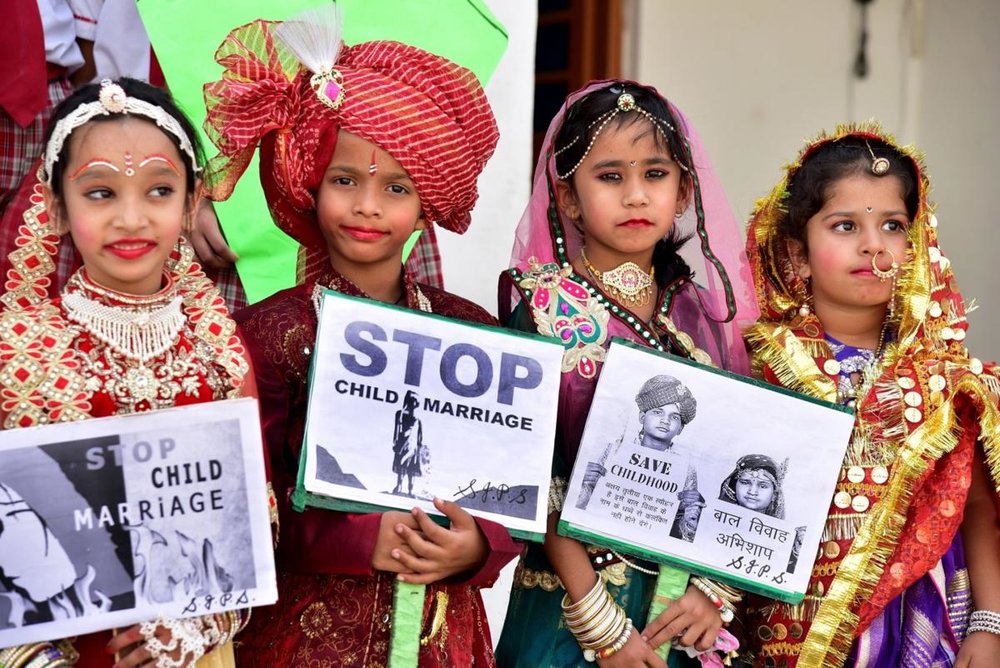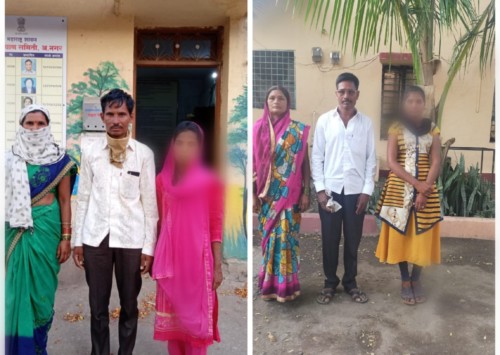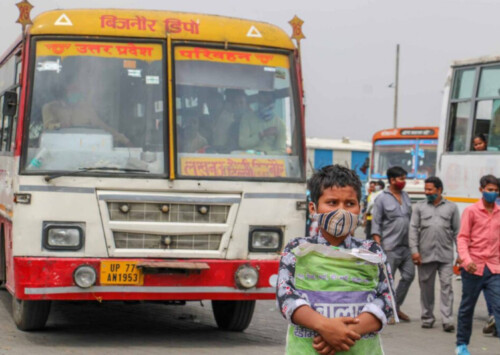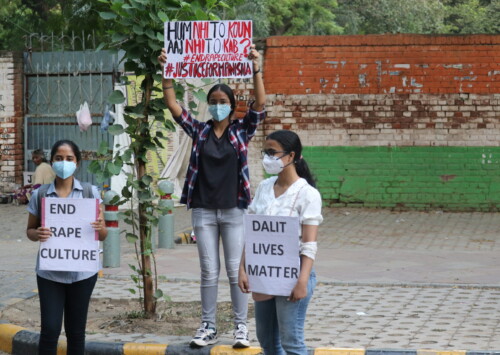Child marriage rose 50 pc during pandemic: NCRB

In its report for 2020, NCRB says a total number of 785 cases of child marriages were registered in India (Photo: UNICEF)
Until 2019, life for Priya (name changed), a 14-year-old girl living with with her parents and an elder brother at Jal Vihar in South Delhi was no different to that of any 14-year-old belonging to low-income family. She was studying in the ninth grade in a near-by government-run school, while her parents struggled to eke out a living for themselves and their two children. Her father cleaned cars in the neighbourhood, while her mother worked as a domestic help.
Priya’s life took a turn for the worse later in the same year when she failed in her exams and her parents forced her to drop out of the school. Priya’s troubles kept on mounting since then and the following year, as the coronavirus raged havoc across the globe and in India, Priya says her parents began pressuring her to get married and after resisting for several months, Priya finally succumbed to the parental pressure earlier this year.
“On January 26 this year, I was forced to get married to a 31-year-old man, he is almost double my age. All this happened as the year before last, I failed in class IX due to lack of adequate attendance. Even though I wanted to continue studying and was fine with repeating the year, my parents didn’t allow me to study again. During the pandemic they took advantage of the situation and got me married forcibly to my maternal uncle,” Priya recounts to Media India Group.
Priya says that even though she did not want to get married at all, she had little say in the matter. And in January, her parents took her to their village in Villupuram, about 150 km south of Chennai, capital of Tamil Nadu. “I had no other option rather than getting married because my parents were using emotional blackmail against me, threatening to end their lives if I did not agree to their demands and took any action against their wish or try to stop the marriage.”
Priya was not the only girl forced to marry even as a minor in India. In its report for 2020, the National Crime Reports Bureau, which compiles all data about crimes across India, says that a total of 785 cases of child marriages were registered in the country last year, a jump of 50 pc over the previous year.
The NCRB says in 2019, 523 cases were registered under the Prohibition of Child Marriage Act, while in 2018, 501 cases were lodged. Child marriage according to Indian law, is a marriage in which either the woman is below the age of 18 or the man is below the age of 21.
NCRB says that with 111 child marriages in 2019, Karnataka topped the list of states where this occurred. Assam came a distant second with 138 child marriage in 2020, West Bengal 98, Tamil Nadu 77 and Telangana 62 cases were reported under Prohibition of child marriage act.
Activists say that NCRB is right in pointing at a sharp spike in the number of cases of child marriage in India last year, but that the actual numbers are far higher than those registered by NCRB. They say that as in most cases the weddings take place with the consent of or due to the pressure of parents on both sides, few cases actually make it to the police records. Priya’s own marriage has also passed under the radar. Activists say that as the economic distress has risen due to the pandemic, many parents have been under pressure to marry off their daughters. “During the pandemic people have lost their work and it became a difficult task to feed everyone in the household without any income. So, for a vulnerable family, many of them had no clue about upcoming days and how they will sustain, so many thought of trying to minimise the number of children to feed and sustain by arranging marriages of their daughters as soon as possible,” Girish Kulkarni, founder of Snehalaya, an NGO, tells Media India Group.
Besides economic reasons, security and societal pressure are other reasons behind child marriage. Kulkarni says that the girl’s safety is often one of the key reasons behind her parents’ desire to get her married off even before she turns 18 as they have to leave their children behind when they go for work, at times for months at a stretch. He says that instead of worrying about the safety of their daughters, they prefer to marry her off. “Getting them married off, even if as a child, acts as a guarantee of safety for them. The parents think that after her marriage, their daughter may be safer and would face very less chances of sexual abuse and physical abuse,” says Kulkarni.
The pandemic has led to a combination of all the factors that lead to child marriage and Kulkarni says that he has seen a huge jump in the number of such cases in the past one year, adding that just in one district, Ahmednagar in western Maharashtra, which is also its main base of operations, Snehalaya has stopped 186 cases of child marriages since the pandemic began. He says in most cases, someone, even the girl concerned herself reaches out to Snehalaya for help in stopping the marriage. “Sometimes, their relatives, neighbours or the child herself seeks help to stop the marriage. It is good to see that children themselves are becoming aware that child marriage is not good or legal and such awareness will play a major role in reducing child marriage,” says Kulkarni.
But, not every child is fortunate enough to get help in time. In most cases, even if the girl is opposed to her marriage, she does not get an opportunity to talk about it in order to stop the marriage.
“Once they had fixed my marriage, my parents snatched my phone, so that I would not be able do anything to stop marriage. They also ensured that I could never step out of home alone and made a cousin always come with me where ever I went,” says Priya.
Girl bride main victim of child marriage
Girls are most seriously impacted by child marriages as in an overwhelming number of cases, the child in question is a girl while the groom is not only an adult, but often many years older than the girl. Moreover, for the girls, an early marriage also means a complete end to education, where already the gender misbalance is widespread as most parents make their daughters drop out at an early age. Moreover, in many cases an early wedding also poses seriously health hazards for the girl who is still a minor, but is treated like an adult. Often girls as young as 15 or 16 become pregnant and as they are neither physically nor mentally prepared to bear a child, their all-round health suffers a huge blow.
Priya is one such case. Though she is only 17, she is already pregnant. Most medical studies point at the severe harm that both the mother and child face in case of an early pregnancy, including anemia and depression.
Despite it being a widespread phenomenon, there are barely. Handful of NGOs that offer help to prevent child marriage. The government’s own focus is also not on this large-scale societal scourge, leaving the girls to face the trauma alone.
“I asked my (elder) brother to support me in order to stop this marriage but he didn’t help me. Most of our relatives also tried to explain to my parents but they did not listen and instead told them to mind their own business and not interfere in our family matters. But now I am suffering here and not even able to tell anyone about this,” says Priya.
Kulkarni says that even when his team receives information and tries to stop the wedding, the parents of the couple prevent them from acting. “After getting information from the place whenever we rush off to the location just to stop the marriage, both the families involved tell us that neither the bride and groom have any problems and that both are adults and ask us not to interfere,” says Kulkarni.
But the girls who have to go through child marriage are unlikely to emerge rapidly from the trauma and stress caused by this. Even though Priya has been married for nearly 10 months now and her wedding was fixed about 15 months earlier, she remains extremely bitter about the experience. “My parents forced me to marry and on my marriage they spent a lot of money and they also gave a big dowry. Instead of this, I would have liked if I could have studied further and not be married off forcible,” she says.












